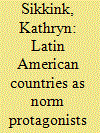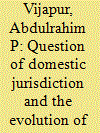| Srl | Item |
| 1 |
ID:
133477


|
|
|
|
|
| Publication |
2014.
|
| Summary/Abstract |
Latin American governments, social movements, and regional organizations have made a far greater contribution to the idea and practice of international human rights than has previously been recognized. Most discussions of the global human rights regime stress its origins in the countries of the Global North. This article explores the role of Latin America states as early protagonists of the international protection of human rights, focusing in particular on the American Declaration of the Rights and Duties of Man. Histories of human rights in the world emphasize the Universal Declaration of Human Rights, passed by the UN General Assembly on 10 December 1948, as the founding moment of international human rights. Few know that Latin American states passed a similar American Declaration of the Rights and Duties of Man a full eight months before passage of the UDHR. The American Declaration thus was the first broad enumeration of rights adopted by an intergovernmental organization. This article explores the American Declaration as an example of often overlooked Latin American human rights protagonism that has continued to this day, and that calls into question the idea that human rights originated in only the Global North.
|
|
|
|
|
|
|
|
|
|
|
|
|
|
|
|
| 2 |
ID:
113254


|
|
|
|
|
| Publication |
2010.
|
| Summary/Abstract |
One important area of UN activity, where innumerable claims to and denials of the applicability of domestic jurisdiction clause have been made, is the question of promotion and protection of human rights. The lack of a clear definition and the ambiguity of these 'terms' had a major impact on the functioning of the UN organs, especially with respect to promoting and protecting human rights. Whenever a state is accused of violating the human rights of its citizens, it generally resorts to Article 2(7) claiming that the matter was not subject to UN jurisdiction. Although both scholars and the government representatives in UN debates have differed on the question of primacy of international over domestic jurisdiction, the overwhelming opinion has shifted in favour of acknowledging the weight of international jurisdiction as evolved through the functioning of various legal instruments and regimes of the UN. This does not imply that the UN's expanded jurisdiction has replaced state jurisdiction. Indeed, the incorporation of many principles/provisions in UN human rights treaties is aimed at protecting the sovereignty of states. The institutionalized monitoring process of international human rights norms shows that virtually all states at present are subject to some international legal obligations as regards the human rights of their citizens.
|
|
|
|
|
|
|
|
|
|
|
|
|
|
|
|
| 3 |
ID:
168737


|
|
|
|
|
| Summary/Abstract |
This lecture marks the seventieth anniversary of the Universal Declaration of Human Rights (UDHR) with an analysis of the Declaration's contemporary relevance. It considers whether, in today's turbulent and fractured political environment in which human rights abuses remain widespread, the UDHR still has a role to play. A case is made that the UDHR was, in fact, written precisely for a moment like now. The lecture starts by considering the important legal impact of the UDHR, whilst acknowledging that the legal enforcement of human rights sometimes overshadows the emotions of care and empathy that lie at the heart of both the Declaration and the whole concept of human rights. It then emphasises the significant role the UDHR has played in giving individuals a voice to hold states accountable. Finally, it explores the UDHR's ethical and inspirational vision that helped to create a baseline of norms and standards aimed at promoting diversity, mutual respect and peace. For all these reasons, the UDHR most certainly needs to be rejuvenated rather than retired.
|
|
|
|
|
|
|
|
|
|
|
|
|
|
|
|